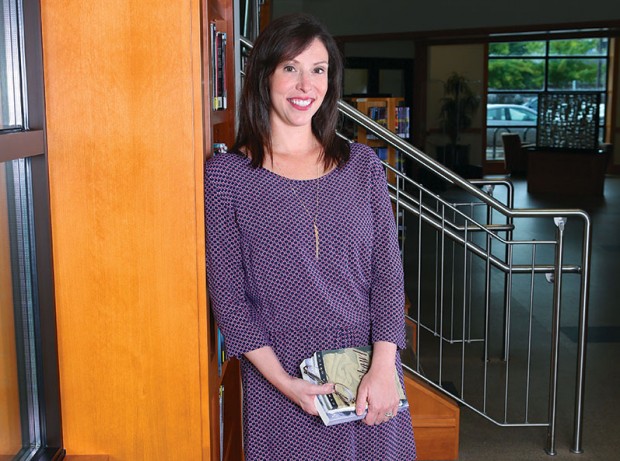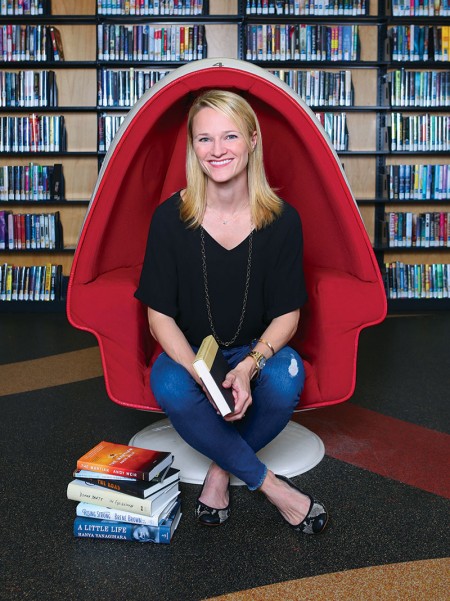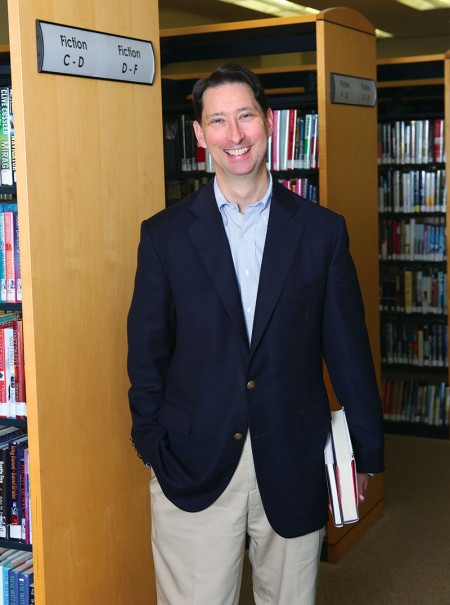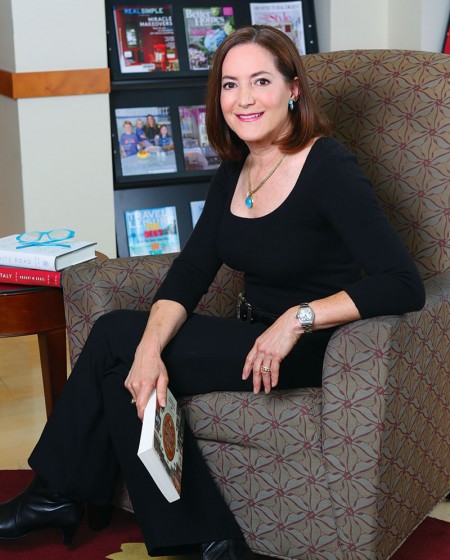One for the Books
Stories that changed their lives


Dr. Mollie Gordon, a Bellaire resident, says The Shawl by Cynthia Ozick influenced her to become a psychiatrist. (Photo: lawellphoto.com)
Alan Gordon always wanted his daughter to love books as much as he does. So, decades ago as a young parent, he started giving her photos of his alma mater, Columbia University, and of libraries.
“My dad used to cut out pictures of libraries and put them on my desk,” recalls Dr. Mollie Gordon, who chuckles and admits that the subliminal messaging must have worked. “I don’t even know what you are supposed to cut out of magazines and put on a teenager’s desk because all I got were libraries. Cars maybe? Or dresses? But I have always loved to read.”
For Alan, a retired intellectual property attorney, the pictures made perfect sense. “I thought these were good places for her to go,” the River Oaks resident says. As an undergraduate scholarship student at Columbia, Alan worked in the campus library. “I loved the silent power of the library. I used to talk to Mollie about the 20 stories of stacks of books at Columbia Butler Library. I had all these photos of libraries that I had studied in during college that are breathtakingly beautiful – gorgeous structures, filled with old leather chairs and wood paneling – and are wonderful places to study.”
Inspired by the libraries and the house rule that they “were allowed to buy ‘as many and any’ books we wanted from the bookstore,” Mollie did become enchanted with reading. “I also had some teachers along the way who really encouraged my love of reading,” says Mollie, a Bellaire resident. “Especially Dr. Z. Bart Thornton at Kinkaid and Dr. Farah Griffin at Penn, whose love of books was contagious.”
These days she reads everything from Pulitzer Prize-winning novelist Jhumpa Lahiri to comedian Tina Fey, but early on there were some books that made a significant impact on her life. “I think a lot of the Holocaust literature I read as a kid, Anne Frank, Elie Wiesel and, as an adult, Viktor Frankl’s Man’s Search for Meaning, made me become interested in the illnesses that are perpetuated by man, against man. Quite possibly the one book that impacted me the most is The Shawl by Cynthia Ozick, about the Holocaust and the death of a prisoner’s daughter in the first chapter. It encouraged an interest in both the resilience of human nature and the ability to perpetuate harm. I think about this book often, especially since becoming a mother, and I wonder if it didn’t have some influence in my choice to become a psychiatrist.”

Avid reader and Southampton resident Morgan Garvey says books by authors Cormac McCarthy, Brené Brown and Emily St. John Mandel have changed her life. (Photo: lawellphoto.com)
The concept of a book influencing life changes is supported wholeheartedly by Southampton resident Morgan Garvey. “When I read The Gifts of Imperfection by Brené Brown at age 39, I felt as though she handed me the instruction manual for my life,” says the stay-at-home mother of three, who will turn 40 this November. “This book and her next two books, Daring Greatly and Rising Strong, have helped me understand human behavior – mine and everyone else’s. After being introduced to the concepts in her books, I started seeing everyone with whom I interact in a new, more compassionate way.”
Additionally, Garvey counts two fictional novels, The Road by Cormac McCarthy and Station Eleven by Emily St. John Mandel, as impacting the way she views life. “They are both works of dystopian literature set after worldwide catastrophic events, which sound bleak, but I love them because they’re both so beautifully written and thought-provoking. The Road is fundamentally about the love between a father and son and a son’s need for safety and protection from an available and sensitive father. Station Eleven is my all-time favorite book. It’s about humanity and civilization after a flu virus wipes out most of the world’s population. I love a book that sticks with me and makes me see the world in a new way.”
Garvey has multiple books on hand to read at all times. So do her children and spouse, Dr. Patrick Garvey. “I love it when my husband and I are moved by or interested in the same book,” she says. “We both loved The Martian by Andy Weir and Unbroken by Laura Hillenbrand.” Garvey counts on recommendations from her book club, local bookstore Brazos Bookstore, the West University Library and Audible.com as providing her with new authors and books to read.
Likewise, Mollie says choosing books to read with her husband, Dr. Ron Karni, is a shared activity, with date nights that regularly include a bookstore stop. “I enjoy historical fiction, narrative fiction and poetry, and I have tried and failed miserably to be a better non-fiction reader,” says Mollie. “My husband is better at that than I am for sure. My husband teases me that I read textbooks for fun!”

River Oaks resident Bill Boyce wrote Miss Fortune’s Last Mission to understand why his father never discussed his time as a soldier in World War II. (Photo: lawellphoto.com)
Reading is an integral part of the job for Bill Boyce, justice of the 14th Court of Appeals. “When I read briefs at the court, I read them skeptically, looking for gaps in logic, assertions that don’t withstand scrutiny, misstatements of the law and factual assertions that sound stretched or implausible. That’s not a relaxing form of reading. In contrast, when I read fiction for pleasure I have more room to suspend disbelief and just go where the story takes me.”
Boyce says two books that have shaped his life are Watership Down by Richard Adams and Lonesome Dove by Larry McMurtry. “There are parallels between these books. At a general level, both books describe an epic journey undertaken by an unlikely band of travelers whose conventional lives are disrupted by an unexpected event. Both books challenged my idea of how a hero acts. Heroism can look like a daring act in a dangerous situation; it also can look like quiet determination in a hopeless situation.”
Boyce also has an affinity for historical fiction, as well as non-fiction books about World War II. Boyce’s father was a veteran who had been injured during the war, yet never spoke a word about the circumstances. “This subject was off limits when my father was alive. He didn’t want to talk about it, and he didn’t want to hear any questions about it,” says Boyce. “In early 2013, about 25 years after my father died, I decided to start looking for answers to the questions I never asked while he was alive.”
Those questions led Boyce to write a book about his father called Miss Fortune’s Last Mission, which explores the elder’s Boyce’s wartime experiences. With an undergraduate degree in journalism from Northwestern and years working as a reporter in Illinois and Oregon, Boyce was familiar with writing. “It describes the story of my father and the B-24 Liberator bomber crew he flew with in WWII. My father and another crew member came home; the remaining crew members died when the plane was shot down on Feb. 22, 1944. I started out to learn what happened to my father when he was wounded in combat; that led me to a much larger story.”
As in fiction, Boyce’s search took him on a personal journey to discover the quiet hero in his father. “I regretted not trying harder to communicate with my father while he was alive. The book was a good way to confront that regret head on and do something productive with it. I sometimes think of this book as the conversation I never had with my father. And with the benefit of hindsight now, looking back on my father’s story, I think absolutely he was heroic – not just the time spent in Italy in WWII, but also in the years after when he was struggling against the ailments and injuries – that’s pretty heroic right there.”
Mollie Gordon says reading is an integral part of what humans need. “I also think, like sleep, water and exercise, reading is a form of self-care,” she says. “The process of reading is healthy and pro social.”

Memorial resident Eve Harrell counts Edmund de Waal’s The Hare with Amber Eyes and The White Road as books that have impacted her life. (Photo: lawellphoto.com)
Memorial resident Eve Harrell agrees and says that even though she enjoys being with friends and family, she finds reading to be restorative. “I love the solace – the quiet time – that proper reading demands of me,” says Harrell, an attorney and community volunteer. “I like to focus on the words and phrases that the author uses. And I love the effect of being spirited away into a good book – whether about history, art, psychology, religion, food and wine, fiction or non-fiction.”
Harrell says her parents read to her as a child. “Reading for me began as a magical, shared experience – one that transported me into the world of make-believe,” she says with a broad smile at the memories. “The pivotal book of my childhood was J.M. Barrie’s Peter Pan, which set me on a course for a vivid imagination, acting and ultimately my first college degree – a BFA in theater from SMU.”
Two books that impacted her are Edmund de Waal’s The Hare with Amber Eyes and The White Road. “Both books trace the history of man-made objects of art and utility, and both have caused me to look at hand-crafted objects with a more appreciative eye. My definition and appreciation of what constitutes ‘art’ – old and new – has definitely expanded. I am amazed and interested that throughout history, different civilizations have always taken the time not just to create tools but to create beauty in simple, everyday objects. For me, books are an extension of that same expression.”
Mollie Gordon echoes that sentiment about a love of books – and libraries. “If I were not a physician,” she says, smiling, “my dream job would be a rare-book librarian.”
Their favorite books
Dr. Mollie Gordon’s Recommendations
Favorite modern fiction author: Jhumpa Lahiri
Historical fiction: Orphan Train, The Invention of Wings
Favorite book in high school: Donna Tartt’s Secret History
Summer reads: Liane Moriarty, Elin Hilderbrand, Katherine Center
Short stories: You are Not a Stranger Here by Adam Haslett
Poetry: Rosmarie Waldrop and Mary Oliver
Reading now: Inherited Disorders, “by a atmospheric-studies major from Harvard about relationships between fathers and their sons and the inheritance of burden and expectation.”
Children’s authors: Roald Dahl, Judy Blume
Morgan Garvey’s Recommendations
Station Eleven by Emily St. John Mandel
The Goldfinch by Donna Tartt
The Road by Cormac McCarthy
A Christmas Carol by Charles Dickens
Unbroken by Laura Hillenbrand
Ego is the Enemy by Ryan Holiday
The Gifts of Imperfection, Daring Greatly and Rising Strong by Brené Brown
A Little Life by Hanya Yanagihara
David Sedaris (everything he writes)
Room by Emma Donoghue
Children’s books:
The Lorax by Dr. Seuss
Where the Sidewalk Ends by Shel Silverstein
Best First Book Ever by Richard Scarry
Olivia series by Ian Falconer
Wonder by R.J. Palacio
Harry Potter series by J. K. Rowling
Because of Mr. Terupt by Rob Buyea
Ivy and Bean series by Annie Barrows
Go, Dog. Go! by P.D. Eastman
Lord of the Flies by William Golding
Let’s Read and Find Out Science series by various authors
Bill Boyce’s Recommendations
Bill Bryson’s A Short History of Nearly Everything; A Walk in the Woods; One Summer: America, 1927; At Home
Watership Down by Richard Adams
Lonesome Dove series by Larry McMurtry
The Boys in the Boat by Daniel James Brown
Seabiscuit: An American Legend and Unbroken by Laura Hillenbrand
The Wright Brothers by David McCullough
Citizen Soldiers and The Wild Blue by Stephen Ambrose
A Higher Call by Adam Makos and Larry Alexander
Team of Rivals by Doris Kearns Goodwin
Eve Harrell’s Recommendations
To Kill A Mockingbird and Go Set A Watchman by Harper Lee
All the Light We Cannot See by Anthony Doerr
The Kite Runner, A Thousand Splendid Suns and And the Mountain Echoed by Khaled Hosseini
The Language of Threads, Dreaming Water and The Samurai’s Garden by Gail Tsukiyama
One Hundred Years of Solitude and Love in the Time of Cholera by Gabriel García Márquez
Rising Tide: The Great Mississippi Flood of 1897 and How It Changed America by John M. Barry
All I Really Need to Know I Learned in Kindergarten by Robert Fulghum
Who Moved My Cheese? by Dr. Spencer Johnson
The Blessing of a Skinned Knee by Wendy Mogel
The Happiness Advantage by Shawn Achor
Candide by Voltaire
Intimate Enemies: The Two Worlds of Baroness de Pontalba by Christina Vella
A History of God by Karen Armstrong
Harry Potter series by J.K. Rowling
The Omnivore’s Dilemma and Cooked by Michael Pollan
The Girl on the Train by Paula Hawkins
The Agony and The Ecstasy by Irving Stone
The Widow Clicquot by Tilar Mazzeo
Saving Italy by Robert M. Edsel
For younger readers:
Peter Pan by J.M. Barrie
Swiss Family Robinson by Robert Louis Stevenson
Little House series by Laura Ingalls Wilder
The Secret Garden by Frances Hodgson Burnett
Little Women by Louisa May Alcott
Jane Eyre and Wuthering Heights by Charlotte Brontë
The Jungle Book and Gunga Din by Rudyard Kipling
The Charge of the Light Brigade by Lord Alfred Tennyson
Editor's note: Thanks to the Houston Public Library for the use of Looscan Neighborhood Library, at 2510 Willowick, for our photo shoot.
Love to read? Be sure to check out our new online collaboration with neighborhood libraries. Find all the buzz about books at Book Buzz.
Want more buzz like this? Sign up for our Morning Buzz emails.
To leave a comment, please log in or create an account with The Buzz Magazines, Disqus, Facebook, or Twitter. Or you may post as a guest.


